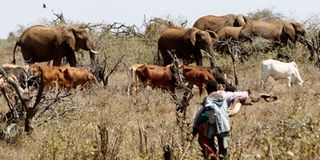For pastoralist areas to have peace, we must contain ruinous politics

Illegal herders at a ranch in Laikipia. Periodic clashes between pastoralists and private ranchers have left a trail of death and destruction in Laikipia County and other parts of the country
Periodic clashes between pastoralists and private ranchers have left a trail of death and destruction in Laikipia County and other parts of the country. We have, regrettably, lost many lives and livestock in waves of cyclic conflicts. That the pattern of the internecine invasions and the causative factors is predictable reinforces the necessity and urgency to bring them to an end.
Over the years, my predecessors at the Interior ministry have variously engaged in the quest for lasting peace in these regions. The last official statement by Prof George Saitoti was to warn leaders of the dangers to national security that recurrent conflicts in pastoral regions portend if left to fester.
Gen Joseph Nkaissery spent many days negotiating peace among warring pastoral communities. Despite the attention and public resources expended on this, these lands have scarcely known tranquillity. Necessity, therefore, dictates that we must do things differently.
At the heart of the solution must be an honest and bold appreciation of the underlying causes of the conflict. A common narrative is that drought triggers pastoralists’ instinctive search-and-find forays for pasture and water. This inevitably leads them to privately owned fenced-off ranches. The resistance by ranch owners to the ‘invasion’ and the pastoralists’ determination to force access becomes the powder keg for deadly feuds.
Insidious agenda
Evidence gathered by security and intelligence agents, however, points to a more insidious agenda. The clashes, historically and as is manifesting now, tend to flare up in the build-up to general elections, around key electoral processes like voter registration or high-stakes political discourses. Beneath the façade of drought-induced crises is a sinister plot informed by politics of conquest, ethnic supremacy, clan chauvinism and petty balkanisation motivated by political interests.
What stokes the violence is an entrenched culture of defiance of legitimate authority that has, unfortunately, become synonymous with heroism.
Engineered hooliganism is the modus operandi for a few leaders running away from accounting for the CDF, devolved monies and other public resources entrusted to them. We should smoke out those hiding behind culture to mask incompetence.
Political practice is the greatest agent of criminal activities in Kenya. Leaders exploit the poor by using them as a collateral in supremacy conquests. Bloody seasonal disputes in pastoral lands point to incitement by sections of the political class that exploit violence for political, commercial and criminal interests.
Politics and crime
There is an unhealthy symbiosis between elective politics and crime in regions where electoral contests are organised around clan and ethnic showdown and exclusion. Drought becomes an alluring excuse for murder and mayhem. The political leaders profit from the violence as the masses pay the price with their lives and livelihoods.
In Laikipia, the government has engaged ranchers and pastoralists in a bid to broker peaceful coexistence and the sharing of pasture and water resources in mutual arrangements. But pastoralists often breach such deals, sneaking in animals beyond the agreed number and for longer durations.
There are also complaints of ranchers losing animals to departing pastoralists and their herds spreading diseases, rendering to waste investments in controlled breeding.
The government will support livestock farming, a serious business that is undertaken by local and foreign investors and creates jobs and supports food security. But this shall be done within the law and right to private property. Livestock farmers ought to take advantage of opportunities in investments and sector reforms introduced by the government to profit from their occupation — such as the revamped Kenya Meat Commission. Rather than risk bloody confrontations in search for scarce pasture or watch as animals waste away from hunger, pastoralists have the option of selling their herd during drought to restock in seasons of plenty.
There are good examples of how visionary leadership can deliver communities from the shackles of mercantile violence. In West Pokot, the county leadership has minimised these conflicts through well-thought out policies, social empowerment and re-engineering of cultural practices like owning unsustainable herds. The people now know peace.
Dr Matiang’i is the Cabinet Secretary for the Interior and Coordination of the National Government.





